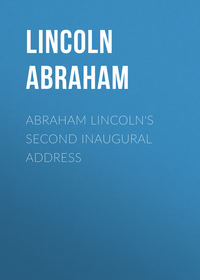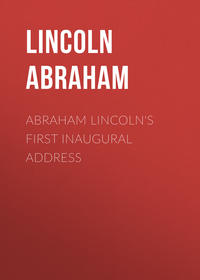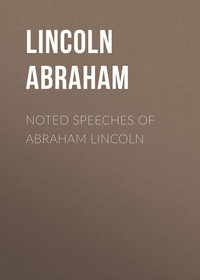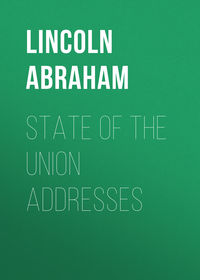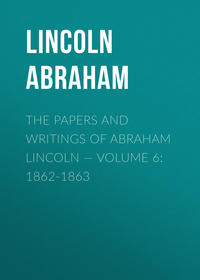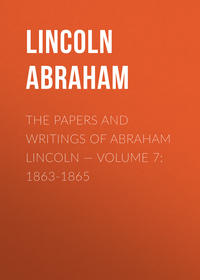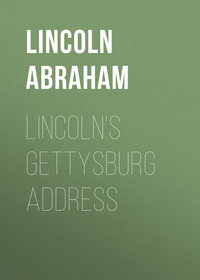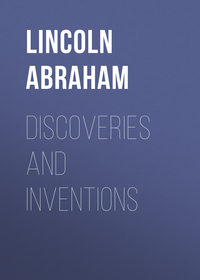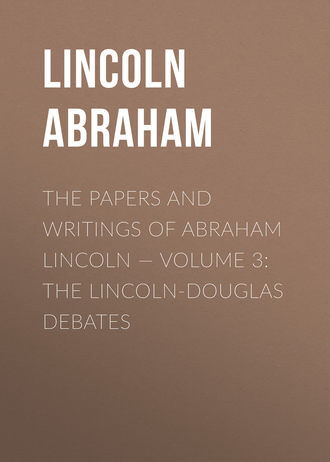 полная версия
полная версияThe Papers And Writings Of Abraham Lincoln — Volume 3: The Lincoln-Douglas Debates
We were often, — more than once, at least, — in the course of Judge Douglas's speech last night, reminded that this government was made for white men; that he believed it was made for white men. Well, that is putting it into a shape in which no one wants to deny it; but the Judge then goes into his passion for drawing inferences that are not warranted. I protest, now and forever, against that counterfeit logic which presumes that because I did not want a negro woman for a slave, I do necessarily want her for a wife. My understanding is that I need not have her for either, but, as God made us separate, we can leave one another alone, and do one another much good thereby. There are white men enough to marry all the white women, and enough black men to marry all the black women; and in God's name let them be so married. The Judge regales us with the terrible enormities that take place by the mixture of races; that the inferior race bears the superior down. Why, Judge, if we do not let them get together in the Territories, they won't mix there.
[A voice: "Three cheers for Lincoln". — The cheers were given with a hearty good-will.]
I should say at least that that is a self-evident truth.
Now, it happens that we meet together once every year, sometimes about the 4th of July, for some reason or other. These 4th of July gatherings I suppose have their uses. If you will indulge me, I will state what I suppose to be some of them.
We are now a mighty nation; we are thirty or about thirty millions of people, and we own and inhabit about one fifteenth part of the dry land of the whole earth. We run our memory back over the pages of history for about eighty-two years, and we discover that we were then a very small people in point of numbers, vastly inferior to what we are now, with a vastly less extent of country, with vastly less of everything we deem desirable among men; we look upon the change as exceedingly advantageous to us and to our posterity, and we fix upon something that happened away back, as in some way or other being connected with this rise of prosperity. We find a race of men living in that day whom we claim as our fathers and grandfathers; they were iron men; they fought for the principle that they were contending for; and we understood that by what they then did it has followed that the degree of prosperity which we now enjoy has come to us. We hold this annual celebration to remind ourselves of all the good done in this process of time, of how it was done and who did it, and how we are historically connected with it; and we go from these meetings in better humor with ourselves, we feel more attached the one to the other, and more firmly bound to the country we inhabit. In every way we are better men in the age and race and country in which we live, for these celebrations. But after we have done all this we have not yet reached the whole. There is something else connected with it. We have — besides these, men descended by blood from our ancestors — among us perhaps half our people who are not descendants at all of these men; they are men who have come from Europe, German, Irish, French, and Scandinavian, — men that have come from Europe themselves, or whose ancestors have come hither and settled here, finding themselves our equals in all things. If they look back through this history to trace their connection with those days by blood, they find they have none, they cannot carry themselves back into that glorious epoch and make themselves feel that they are part of us; but when they look through that old Declaration of Independence, they find that those old men say that "We hold these truths to be self-evident, that all men are created equal"; and then they feel that that moral sentiment, taught in that day, evidences their relation to those men, that it is the father of all moral principle in them, and that they have a right to claim it as though they were blood of the blood, and flesh of the flesh, of the men who wrote that Declaration; and so they are. That is the electric cord in that Declaration that links the hearts of patriotic and liberty-loving men together, that will link those patriotic hearts as long as the love of freedom exists in the minds of men throughout the world.
Now, sirs, for the purpose of squaring things with this idea of "don't care if slavery is voted up or voted down," for sustaining the Dred Scott decision, for holding that the Declaration of Independence did not mean anything at all, we have Judge Douglas giving his exposition of what the Declaration of Independence means, and we have him saying that the people of America are equal to the people of England. According to his construction, you Germans are not connected with it. Now, I ask you in all soberness if all these things, if indulged in, if ratified, if confirmed and indorsed, if taught to our children, and repeated to them, do not tend to rub out the sentiment of liberty in the country, and to transform this government into a government of some other form. Those arguments that are made, that the inferior race are to be treated with as much allowance as they are capable of enjoying; that as much is to be done for them as their condition will allow, — what are these arguments? They are the arguments that kings have made for enslaving the people in all ages of the world. You will find that all the arguments in favor of kingcraft were of this class; they always bestrode the necks of the people not that they wanted to do it, but because the people were better off for being ridden. That is their argument, and this argument of the Judge is the same old serpent that says, You work, and I eat; you toil, and I will enjoy the fruits of it. Turn in whatever way you will, whether it come from the mouth of a king, an excuse for enslaving the people of his country, or from the mouth of men of one race as a reason for enslaving the men of another race, it is all the same old serpent; and I hold, if that course of argumentation that is made for the purpose of convincing the public mind that we should not care about this should be granted, it does not stop with the negro. I should like to know, if taking this old Declaration of Independence, which declares that all men are equal upon principle, and making exceptions to it, where will it stop? If one man says it does not mean a negro, why not another say it does not mean some other man? If that Declaration is not the truth, let us get the statute book, in which we find it, and tear it out! Who is so bold as to do it? If it is not true, let us tear it out! [Cries of "No, no."] Let us stick to it, then; let us stand firmly by it, then.
It may be argued that there are certain conditions that make necessities and impose them upon us; and to the extent that a necessity is imposed upon a man, he must submit to it. I think that was the condition in which we found ourselves when we established this government. We had slavery among us, we could not get our Constitution unless we permitted them to remain in slavery, we could not secure the good we did secure if we grasped for more; and having by necessity submitted to that much, it does not destroy the principle that is the charter of our liberties. Let that charter stand as our standard.
My friend has said to me that I am a poor hand to quote Scripture. I will try it again, however. It is said in one of the admonitions of our Lord, "As your Father in heaven is perfect, be ye also perfect." The Savior, I suppose, did not expect that any human creature could be perfect as the Father in heaven; but he said, "As your Father in heaven is perfect, be ye also perfect." He set that up as a standard; and he who did most towards reaching that standard attained the highest degree of moral perfection. So I say in relation to the principle that all men are created equal, let it be as nearly reached as we can. If we cannot give freedom to every creature, let us do nothing that will impose slavery upon any other creature. Let us then turn this government back into the channel in which the framers of the Constitution originally placed it. Let us stand firmly by each other. If we do not do so, we are turning in the contrary direction, that our friend Judge Douglas proposes — not intentionally — as working in the traces tends to make this one universal slave nation. He is one that runs in that direction, and as such I resist him.
My friends, I have detained you about as long as I desired to do, and I have only to say: Let us discard all this quibbling about this man and the other man, this race and that race and the other race being inferior, and therefore they must be placed in an inferior position; discarding our standard that we have left us. Let us discard all these things, and unite as one people throughout this land, until we shall once more stand up declaring that all men are created equal.
My friends, I could not, without launching off upon some new topic, which would detain you too long, continue to-night. I thank you for this most extensive audience that you have furnished me to-night. I leave you, hoping that the lamp of liberty will burn in your bosoms until there shall no longer be a doubt that all men are created free and equal.
SPEECH AT SPRINGFIELD, JULY 17, 1858
DELIVERED SATURDAY EVENING(Mr. Douglas was not present.)
FELLOW-CITIZENS: — Another election, which is deemed an important one, is approaching, and, as I suppose, the Republican party will, without much difficulty, elect their State ticket. But in regard to the Legislature, we, the Republicans, labor under some disadvantages. In the first place, we have a Legislature to elect upon an apportionment of the representation made several years ago, when the proportion of the population was far greater in the South (as compared with the North) than it now is; and inasmuch as our opponents hold almost entire sway in the South, and we a correspondingly large majority in the North, the fact that we are now to be represented as we were years ago, when the population was different, is to us a very great disadvantage. We had in the year 1855, according to law, a census, or enumeration of the inhabitants, taken for the purpose of a new apportionment of representation. We know what a fair apportionment of representation upon that census would give us. We know that it could not, if fairly made, fail to give the Republican party from six to ten more members of the Legislature than they can probably get as the law now stands. It so happened at the last session of the Legislature that our opponents, holding the control of both branches of the Legislature, steadily refused to give us such an apportionment as we were rightly entitled to have upon the census already taken. The Legislature steadily refused to give us such an apportionment as we were rightfully entitled to have upon the census taken of the population of the State. The Legislature would pass no bill upon that subject, except such as was at least as unfair to us as the old one, and in which, in some instances, two men in the Democratic regions were allowed to go as far toward sending a member to the Legislature as three were in the Republican regions. Comparison was made at the time as to representative and senatorial districts, which completely demonstrated that such was the fact. Such a bill was passed and tendered to the Republican Governor for his signature; but, principally for the reasons I have stated, he withheld his approval, and the bill fell without becoming a law.
Another disadvantage under which we labor is that there are one or two Democratic Senators who will be members of the next Legislature, and will vote for the election of Senator, who are holding over in districts in which we could, on all reasonable calculation, elect men of our own, if we only had the chance of an election. When we consider that there are but twenty-five Senators in the Senate, taking two from the side where they rightfully belong, and adding them to the other, is to us a disadvantage not to be lightly regarded. Still, so it is; we have this to contend with. Perhaps there is no ground of complaint on our part. In attending to the many things involved in the last general election for President, Governor, Auditor, Treasurer, Superintendent of Public Instruction, Members of Congress, of the Legislature, County Officers, and so on, we allowed these things to happen by want of sufficient attention, and we have no cause to complain of our adversaries, so far as this matter is concerned. But we have some cause to complain of the refusal to give us a fair apportionment.
There is still another disadvantage under which we labor, and to which I will ask your attention. It arises out of the relative positions of the two persons who stand before the State as candidates for the Senate. Senator Douglas is of world-wide renown. All the anxious politicians of his party, or who have been of his party for years past, have been looking upon him as certainly, at no distant day, to be the President of the United States. They have seen in his round, jolly, fruitful face post-offices, land-offices, marshalships, and cabinet appointments, charge-ships and foreign missions bursting and sprouting out in wonderful exuberance, ready to be laid hold of by their greedy hands. And as they have been gazing upon this attractive picture so long, they cannot, in the little distraction that has taken place in the party, bring themselves to give up the charming hope; but with greedier anxiety they rush about him, sustain him, and give him marches, triumphal entries, and receptions beyond what even in the days of his highest prosperity they could have brought about in his favor. On the contrary, nobody has ever expected me to be President. In my poor, lean, lank face, nobody has ever seen that any cabbages were sprouting out. These are disadvantages all, taken together, that the Republicans labor under. We have to fight this battle upon principle, and upon principle alone. I am, in a certain sense, made the standard-bearer in behalf of the Republicans. I was made so merely because there had to be some one so placed, — I being in nowise preferable to any other one of twenty-five, perhaps a hundred, we have in the Republican ranks. Then I say I wish it to be distinctly understood and borne in mind that we have to fight this battle without many — perhaps without any of the external aids which are brought to bear against us. So I hope those with whom I am surrounded have principle enough to nerve themselves for the task, and leave nothing undone that can be fairly done to bring about the right result.
After Senator Douglas left Washington, as his movements were made known by the public prints, he tarried a considerable time in the city of New York; and it was heralded that, like another Napoleon, he was lying by and framing the plan of his campaign. It was telegraphed to Washington City, and published in the Union, that he was framing his plan for the purpose of going to Illinois to pounce upon and annihilate the treasonable and disunion speech which Lincoln had made here on the 16th of June. Now, I do suppose that the Judge really spent some time in New York maturing the plan of the campaign, as his friends heralded for him. I have been able, by noting his movements since his arrival in Illinois, to discover evidences confirmatory of that allegation. I think I have been able to see what are the material points of that plan. I will, for a little while, ask your attention to some of them. What I shall point out, though not showing the whole plan, are, nevertheless, the main points, as I suppose.
They are not very numerous. The first is popular sovereignty. The second and third are attacks upon my speech made on the 16th of June. Out of these three points — drawing within the range of popular sovereignty the question of the Lecompton Constitution — he makes his principal assault. Upon these his successive speeches are substantially one and the same. On this matter of popular sovereignty I wish to be a little careful. Auxiliary to these main points, to be sure, are their thunderings of cannon, their marching and music, their fizzlegigs and fireworks; but I will not waste time with them. They are but the little trappings of the campaign.
Coming to the substance, — the first point, "popular sovereignty." It is to be labeled upon the cars in which he travels; put upon the hacks he rides in; to be flaunted upon the arches he passes under, and the banners which wave over him. It is to be dished up in as many varieties as a French cook can produce soups from potatoes. Now, as this is so great a staple of the plan of the campaign, it is worth while to examine it carefully; and if we examine only a very little, and do not allow ourselves to be misled, we shall be able to see that the whole thing is the most arrant Quixotism that was ever enacted before a community. What is the matter of popular sovereignty? The first thing, in order to understand it, is to get a good definition of what it is, and after that to see how it is applied.
I suppose almost every one knows that, in this controversy, whatever has been said has had reference to the question of negro slavery. We have not been in a controversy about the right of the people to govern themselves in the ordinary matters of domestic concern in the States and Territories. Mr. Buchanan, in one of his late messages (I think when he sent up the Lecompton Constitution) urged that the main point to which the public attention had been directed was not in regard to the great variety of small domestic matters, but was directed to the question of negro slavery; and he asserts that if the people had had a fair chance to vote on that question there was no reasonable ground of objection in regard to minor questions. Now, while I think that the people had not had given, or offered, them a fair chance upon that slavery question, still, if there had been a fair submission to a vote upon that main question, the President's proposition would have been true to the utmost. Hence, when hereafter I speak of popular sovereignty, I wish to be understood as applying what I say to the question of slavery only, not to other minor domestic matters of a Territory or a State.
Does Judge Douglas, when he says that several of the past years of his life have been devoted to the question of "popular sovereignty," and that all the remainder of his life shall be devoted to it, does he mean to say that he has been devoting his life to securing to the people of the Territories the right to exclude slavery from the Territories? If he means so to say he means to deceive; because he and every one knows that the decision of the Supreme Court, which he approves and makes especial ground of attack upon me for disapproving, forbids the people of a Territory to exclude slavery. This covers the whole ground, from the settlement of a Territory till it reaches the degree of maturity entitling it to form a State Constitution. So far as all that ground is concerned, the Judge is not sustaining popular sovereignty, but absolutely opposing it. He sustains the decision which declares that the popular will of the Territory has no constitutional power to exclude slavery during their territorial existence. This being so, the period of time from the first settlement of a Territory till it reaches the point of forming a State Constitution is not the thing that the Judge has fought for or is fighting for, but, on the contrary, he has fought for, and is fighting for, the thing that annihilates and crushes out that same popular sovereignty.
Well, so much being disposed of, what is left? Why, he is contending for the right of the people, when they come to make a State Constitution, to make it for themselves, and precisely as best suits themselves. I say again, that is quixotic. I defy contradiction when I declare that the Judge can find no one to oppose him on that proposition. I repeat, there is nobody opposing that proposition on principle. Let me not be misunderstood. I know that, with reference to the Lecompton Constitution, I may be misunderstood; but when you understand me correctly, my proposition will be true and accurate. Nobody is opposing, or has opposed, the right of the people, when they form a constitution, to form it for themselves. Mr. Buchanan and his friends have not done it; they, too, as well as the Republicans and the Anti-Lecompton Democrats, have not done it; but on the contrary, they together have insisted on the right of the people to form a constitution for themselves. The difference between the Buchanan men on the one hand, and the Douglas men and the Republicans on the other, has not been on a question of principle, but on a question of fact.
The dispute was upon the question of fact, whether the Lecompton Constitution had been fairly formed by the people or not. Mr. Buchanan and his friends have not contended for the contrary principle any more than the Douglas men or the Republicans. They have insisted that whatever of small irregularities existed in getting up the Lecompton Constitution were such as happen in the settlement of all new Territories. The question was, Was it a fair emanation of the people? It was a question of fact, and not of principle. As to the principle, all were agreed. Judge Douglas voted with the Republicans upon that matter of fact.
He and they, by their voices and votes, denied that it was a fair emanation of the people. The Administration affirmed that it was. With respect to the evidence bearing upon that question of fact, I readily agree that Judge Douglas and the Republicans had the right on their side, and that the Administration was wrong. But I state again that, as a matter of principle, there is no dispute upon the right of a people in a Territory, merging into a State, to form a constitution for themselves without outside interference from any quarter. This being so, what is Judge Douglas going to spend his life for? Is he going to spend his life in maintaining a principle that nobody on earth opposes? Does he expect to stand up in majestic dignity, and go through his apotheosis and become a god in the maintaining of a principle which neither man nor mouse in all God's creation is opposing? Now something in regard to the Lecompton Constitution more specially; for I pass from this other question of popular sovereignty as the most arrant humbug that has ever been attempted on an intelligent community.
As to the Lecompton Constitution, I have already said that on the question of fact, as to whether it was a fair emanation of the people or not, Judge Douglas, with the Republicans and some Americans, had greatly the argument against the Administration; and while I repeat this, I wish to know what there is in the opposition of Judge Douglas to the Lecompton Constitution that entitles him to be considered the only opponent to it, — as being par excellence the very quintessence of that opposition. I agree to the rightfulness of his opposition. He in the Senate and his class of men there formed the number three and no more. In the House of Representatives his class of men — the Anti-Lecompton Democrats — formed a number of about twenty. It took one hundred and twenty to defeat the measure, against one hundred and twelve. Of the votes of that one hundred and twenty, Judge Douglas's friends furnished twenty, to add to which there were six Americans and ninety-four Republicans. I do not say that I am precisely accurate in their numbers, but I am sufficiently so for any use I am making of it.
Why is it that twenty shall be entitled to all the credit of doing that work, and the hundred none of it? Why, if, as Judge Douglas says, the honor is to be divided and due credit is to be given to other parties, why is just so much given as is consonant with the wishes, the interests, and advancement of the twenty? My understanding is, when a common job is done, or a common enterprise prosecuted, if I put in five dollars to your one, I have a right to take out five dollars to your one. But he does not so understand it. He declares the dividend of credit for defeating Lecompton upon a basis which seems unprecedented and incomprehensible.
Let us see. Lecompton in the raw was defeated. It afterward took a sort of cooked-up shape, and was passed in the English bill. It is said by the Judge that the defeat was a good and proper thing. If it was a good thing, why is he entitled to more credit than others for the performance of that good act, unless there was something in the antecedents of the Republicans that might induce every one to expect them to join in that good work, and at the same time something leading them to doubt that he would? Does he place his superior claim to credit on the ground that he performed a good act which was never expected of him? He says I have a proneness for quoting Scripture. If I should do so now, it occurs that perhaps he places himself somewhat upon the ground of the parable of the lost sheep which went astray upon the mountains, and when the owner of the hundred sheep found the one that was lost, and threw it upon his shoulders and came home rejoicing, it was said that there was more rejoicing over the one sheep that was lost and had been found than over the ninety and nine in the fold. The application is made by the Saviour in this parable, thus: "Verily, I say unto you, there is more rejoicing in heaven over one sinner that repenteth, than over ninety and nine just persons that need no repentance."


